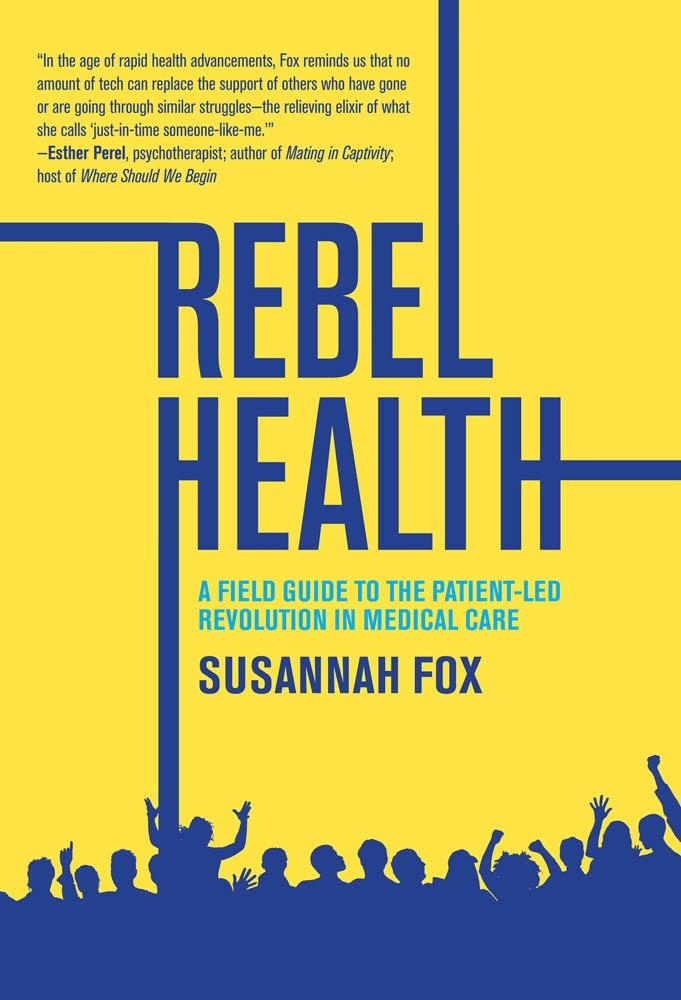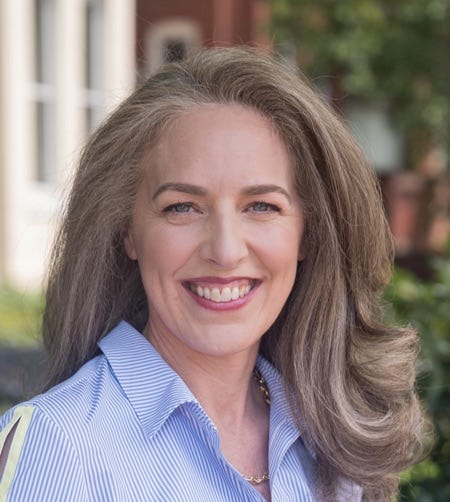Personal Science Week - 240307 Rebel Health
A new book by public health expert Susannah Fox
We like to stay up-to-date on the latest books relevant to personal scientists.
This week we review a new book from public health expert Susannah Fox.
Rebel Health: A Field Guide to the Patient-Led Revolution in Medical Care
Author Susannah Fox is a people person. As the youngest of three in a family with abundant cousins, she’s drawn to happy stories of people working together to solve problems. So when she encourages us to “rebel”, she doesn’t mean break rules or cause havoc. For better or worse, this is not a call for an overthrow of the current system.
A better title for her new book would be “peer-to-peer health care”, a term she coined more than a decade ago to describe people who form networks to share information about difficult or sensitive medical issues. They’re not rebelling so much as augmenting the current system.
Her subjects include people frustrated over the lack of attention to their lingering COVID symptoms — a malady that we now call “Long COVID” thanks to their largely grassroots efforts.
Or people suffering from Type 1 diabetes, who upon learning how straightforward it is to build a fully-automatic artificial pancreas, shared online specs to enable anyone to do it themselves — long before the FDA’s cumbersome approval process allowed companies to sell similar products.
In other words, personal science: the term she uses to highlight an important part of the solution, with a nice shout-out to the Quantified Self community and the book co-authored by Gary Wolf.
Fox describes four categories of people working to improve the US healthcare system:
Seekers notice problems that are insufficiently addressed through conventional channels
Networkers connect groups of people with similar concerns
Solvers attack the problems with a solution mindset
Champions help bring ideas to scale
Seekers are surprisingly common, but they often stop after a session or two with “Dr. Google”. Many are suffering from conditions that are too embarrassing to discuss with others, even a doctor. Some are just shy, reluctant to speak up even when they suspect that the medical system is making things worse. Too many tragic examples of this led to “Condition H”, a protocol now adopted by many hospitals to empower family members to raise the alarm when a loved one seems in dire need of quick care.
Often, seekers' first big relief happens when they discover a name for their condition, because that’s when they can join with the networkers, people who connect and maintain communities of people with similar issues. Ms. Fox relates her own epiphany when one of her children had serious food allergies. She learned about treatment ideas, not through her standard healthcare channels, but from a peer support group she stumbled upon.
Too many health officials dismiss these amateur networking organizations as cesspools of misinformation, but Fox notes that measurements of online patient communities show the overall accuracy to be quite high. A 2006 BMJ analysis of breast cancer information found only 10 of 4600 postings were false or misleading — and most of those were corrected within hours.
It’s comforting to be able to associate with others who have the same condition, but it’s the solvers that inspire the personal scientists. When Fox reminds us that under US law an individual can experiment on themselves – or their child – but not on anyone else, she quotes John Costik (inventor of the Nightscout diabetes system): “In my house, I am the FDA”. Sounds like a great slogan for personal science!
These solvers include Dana Lewis and the OpenAPS diabetes control system, of course, but also Bryan Mazlish, “The Bigfoot of diabetes hackers” (Wired 2014) and founder of Bigfoot Biomedical (acquired by Abbott in Sept 2023). Hugo Campos founded the Bay Area ICD group for people who want to hack their pacemakers. He bought a used ICD programming machine on eBay for $1000. Jimmy Choi is an elite athlete who in 2020 via Tiktok begged somebody to make a pill bottle for Parkinsons sufferers and quickly received multiple promising designs.
A key to supporting these peer-to-peer health seekers, networkers, and solvers are what Fox calls champions: public health insiders, celebrity influencers, or others who can bring publicity, funding, and additional resources to the issue. Fox thinks we can do much better, and proposes the idea of “ambassador” — government officials responsible for encouraging grass-roots innovators, partly through contests like the America COMPETES Reauthorization Act or InnoCentive (a company that runs prize competitions).
In other words, the “rebels” in this book are not going to actually disobey the FDA or the CDC or any other public health authorities. Like Fox, they want to get along; they just want the system to move a little faster. Please.
It’s this get-along attitude that explains why Fox doesn’t dwell on the many ways the American Healthcare system is broken. After all, it’s her system: she was CTO at the Obama Administration’s Department of Health and Human Services. Few of her examples would really challenge the centralized, top-down vision behind what we now call Obamacare, or its predecessors Medicare or the Veterans Administration, or for that matter the National Institutes of Health, FDA, or CDC. These highly-regulated, faceless and often unaccountable bureaucracies aren’t a problem this book hopes to solve; they just need some tweaking to be more responsive to everyday people.
Fox’s audience is people like her, embedded in the existing healthcare system but open to ideas that can make things better. This is not a collection of technical insights like Lee Hood’s The Age of Scientific Wellness or a work of investigative journalist like Amy Dockser Marcus in We the Scientists. Read it for its inspiring anecdotes about ordinary people who found ways to make things better in the current system.
If these are "rebels”, then I’m not sure what word Fox would use to describe the people who reject the Empire entirely, who think the US health care system is one big Death Star. Like all anti-establishment movements, real rebellions often include some questionable characters. Think of people who synthesize their own cancer drugs and COVID vaccines, who do their own bioengineering and then inject themselves with new DNA. They titrate themselves with Black Mamba venom to make themselves immune to snake bites. Some give up on the US health care system entirely to seek treatment outside the US. After all, having been diagnosed with an incurable, fatal condition, what have they got to lose?
The COVID pandemic – and the US healthcare system’s disastrous handling of it — gave plenty of reasons for those of us who aren’t by nature rebellious to question the degree to which we want to be dependent on health “experts”. How many authorities confidently assert one-size-fits-all treatments — often mandated — only to backtrack later when “the science changed”. And don’t get me started on the IRB nightmare or the absurdity of peer review. Do I really want to be controlled by them? I prefer to do the science myself.
Fixing a system that is fundamentally broken is a big job, and Fox’s book is a welcome recognition that normal people can and should expect more. But peer-to-peer health care networks alone can’t fix the problems of a top-down system with its myriad restrictions on the research that can be conducted, or what it’s okay to talk about online. We’ll need real rebels for that, including people willing to break the rules.
Meanwhile, at least in my house, I’m the FDA.
Read tons more resources and worthwhile content, including links for how to buy the book at Susannahfox.com.
If you’re in the Seattle area on Wednesday March 13, please join me at Townhall Seattle for the author’s conversation with science writer Sally James. Susannah will be in San Francisco that week as well.
Links Worth Your Time
A few more facts and resources worth noting from Rebel Health:
More than 50% of valuable innovations originate from end-users, not professionals
"four in ten US adults" are caring for a loved one (p.27)
The Rock Health Digital Health Survey 2022: “46% of Survey respondents reported owning a wearable device, a steady albeit small increase from 2021 (45%) and 2020 (43%)”
Not mentioned in the book, but of interest to readers: Apple ResearchKit investigator Steven Friend says that after their large Parkinsons Study, researchers asked their 12,000+ subjects for anecdotal suggestions for self-treatment. To their surprise, most of the effective treatments were surprisingly simple (e.g. “my neighbor moved”, “got a new chair”). https://4youandme.org/
If you haven't done a colonoscopy, the biotech company Natera is doing a study to prove their cell-free DNA technology can detect cancer just as well through an at-home blood test. Sign up to participate in their trial and they'll ship you a test kit. Complete a real colonoscopy afterwards and they'll give you $300 for your trouble. (In the US, colonoscopies are generally 100% covered by health insurance if you're over age 50 or have other risks)
About Personal Science
Collect your own data, think for yourself, and be skeptical. Those are some of the many characteristics of people who practice science for personal reasons. We publish weekly, every Thursday, but we intend most of our issues to be useful for years to come. You may especially want to browse past posts on blood tests, conspiracy theories, storing your data, and much more. Paid subscribers also have access to our Unpopular Science series, for rebels who can be trusted with information that might get you in trouble, including our latest look at controversial ideas about men and women, COVID, and plastic.
If you have personal science ideas you’d like to contribute, contact us or leave a comment.




Colonoscopies are now generally covered by health insurance if you are *45* or older.